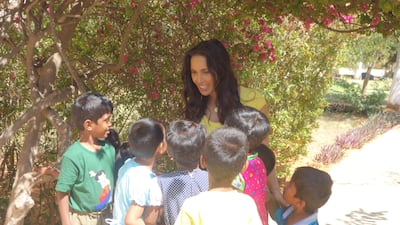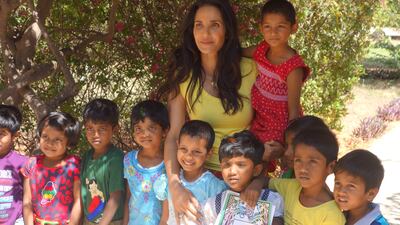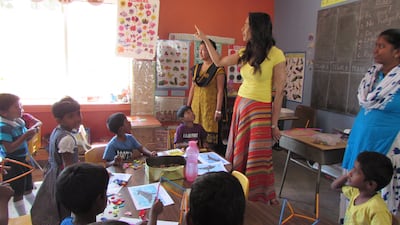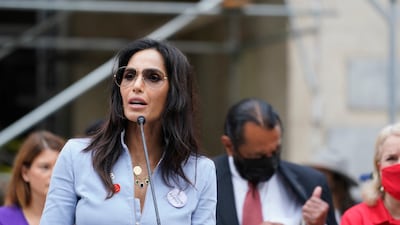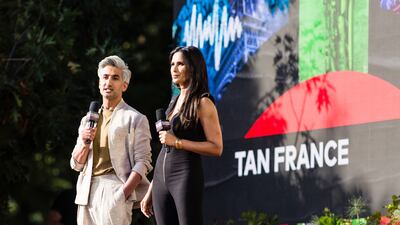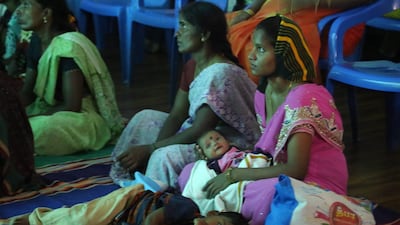Padma Lakshmi's career has been filled with highlights, from creating the Hulu series Taste the Nation to hosting Top Chef to writing a best-selling memoir and numerous cookbooks. But one of her life's “seminal moments”, she says, was decidedly lower profile.
When Lakshmi visited Shanti Bhavan, a boarding school in her home state of Tamil Nadu in India, in 2012 and found herself surrounded by 250 of its pupils, it was a moment that still moves her today.
“When I look at those children, I see my younger self,” she said. “I easily could have been born in a family like theirs.”
White House celebrates Diwali — video
Ajit George, Shanti Bhavan’s director of operations, said the school is grateful for Lakshmi’s personal donations and the corporate donations she seeks in return for her speeches.
Her visit to the school still inspires the pupils, who come from households in poverty, earning less than $2 a day.
Shanti Bhavan, which is celebrating its 25th anniversary, accommodates about 300 pupils ages four to 22.
Each year, the school selects an additional 28 pupils to replace graduates. But up to 500 children apply, Mr George said, which is why they hope to open a second school in 2024 to meet the demand.
Lakshmi said she is committed to supporting Shanti Bhavan and its approach to education.

“I was very, very impressed — not only with the mission but with how they thought of this child and the student holistically as a human being,” she said.
“They understand the culture shock of coming from some of the poorest families in that area to a school like that, being introduced to all the things that they’re introduced to can be psychologically jarring.”
Lakshmi spoke recently with The Associated Press about her philanthropy and her connection to Shanti Bhavan.
“I don’t really feel like I’m a role model,: Lakshmi said. “I just feel like I’m in a place where I can help them and I should help them because I can. It’s as simple as that.
“Whatever help or guidance they’ve got from me, whether it’s monetary or through my presence or efforts, I have got just as much, if not more, from those children.
“Shanti Bhavan is this beacon of light in a very dark time, and I’m so happy it exists. I’m very honoured to be able to help.”
Lakshmi added that, if there’s one common denominator in all of the causes that she has been involved in: it’s about equality and levelling the playing field.
“When I started my women’s health foundation, one of the reasons I did it is that I had gone through an illness and I had felt so held back because of something I couldn’t control,” she said.
“For me, making sure that young women and girls got screened for endometriosis and got the care they needed much earlier than I did meant that they would have an equal playing field with their male counterparts.
“It’s so much more difficult for a woman to advance in your career for a whole host of reasons than it is for a man. When you add a debilitating chronic gynaecological disease to the mix, it compounds that.”

Lakshmi also does extensive work with the American Civil Liberties Union, or ACLU.
“I am an immigrant, and I really am thankful to this country for giving my mother the opportunity to build a new life for us when she had a very turbulent marriage,” she said.
“We were a middle-class family, where my mother had a college degree and was trained as a nurse so she could support herself and got a visa to come here because there was a shortage of medical professionals here in America in the ’70s.
“And my mother, in return, has given a lot to this country. So I feel that immigrants have a foundational role to play in the history of this country, and villainising them, whether they come with a visa or as a refugee, is not the answer. We’re actually shooting ourselves in the foot as a nation.”
In the end, Lakshmi's approach to philanthropy is simple.
“It sounds corny, but really the world will be better. It’s not enough that I worry just about my child or my neighbour’s child.
“We are all connected, whether we want to be or not. So that’s how a child in Brazil or India or Nigeria who does not get an education, who does not also get a fair chance at life one day is involved. My child will grow up with those children in the same world, and they will still affect each other.”

